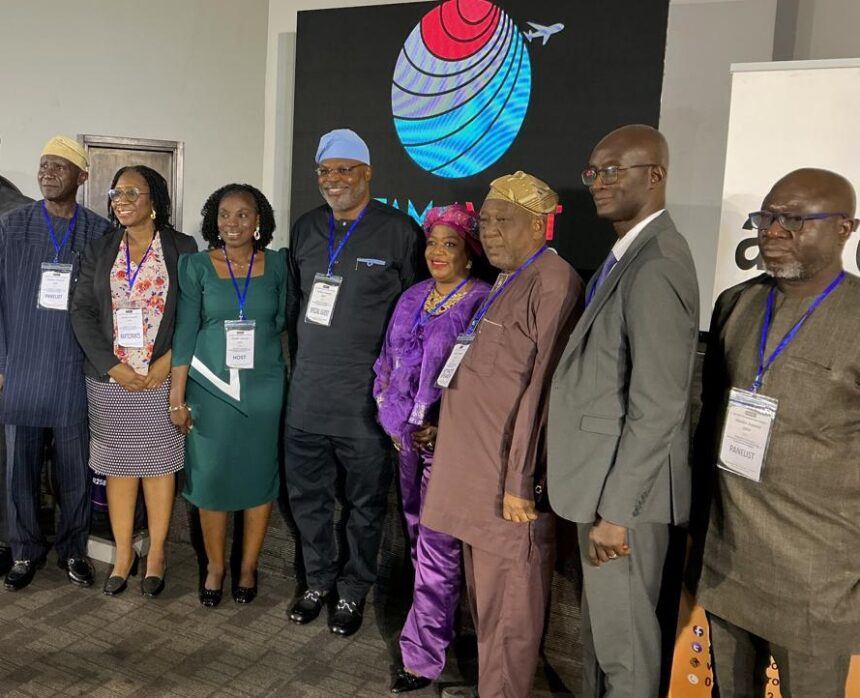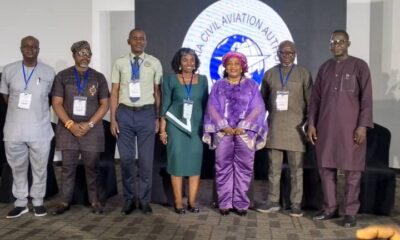Maritime
‘Policy Fragmentation, Human Capital Gaps Undermining Nigeria’s Transport Goals’ – Stakeholders

BY EGUONO ODJEGBA
Experts and stakeholders in Nigeria’s transport sector last week lamented its inefficient state arising from policy fragmentation, poor political and official interference, and human capital gaps.
The stakeholders who gathered at the Providence Hotel, Ikeja Lagos for a one day transport infrastructure summit organized by JustNet News media outfit in Lagos last Wednesday, warned that unless urgent, bold and realistic actions are taken, the sector would continue to deteriorate.
According to the stakeholders, the sector will continue to post negative returns on the gross national product with very little impact on the national development index due to ill administration and poor governance system.
Nigeria’s frontline transport academic, Professor Bamidele A. Badejo who fired the first salvo while delivering the keynote address exposed deep-rooted systemic issues plaguing the transport sector, chief among which is regulatory fragmentation, excessive portfolios and a troubling reliance on what he described as ‘under-qualified personnel.’
“Nigeria’s transport sector is riddled with policy inconsistency and a proliferation of agencies. This creates confusion, duplication, and inefficiency”, he said. This is even as he criticized the lack of a unified national transport agenda, which he said has stunted progress for decades.
The professor also raised alarms about the human resource crisis in the sector. “We are dominated by a Qualified By Experience (QBE) workforce rather than professionally trained experts.” This, he argued, hampers innovation and strategic planning.
Prof Badejo’s lecture highlighted other challenges including energy instability, poor maintenance culture, and indiscipline within the system. Yet, he remained optimistic, pointing to Nigeria’s unique ability to leapfrog outdated technologies—just as it did with mobile telephony.
He called for the adoption of an integrated multi-modal system combining road, rail, air, and water transport, saying it is vital to reduce costs, improve connectivity, and promote environmental sustainability.
“By combining all transport modes and embracing digital technology and clean energy, Nigeria can boost efficiency, cut emissions, and enhance national productivity. We must tackle challenges like weak infrastructure, political interference, and poor funding,” he said.
He also advocated a workable blueprint for integrated land-use planning, enabling regulatory environments, and strategic partnerships that can unlock finance and innovation.

“By combining road, rail, air, and water transportation modes, Nigeria can improve efficiency, reduce costs, and promote environmental sustainability. The time to act is now. The future will not just happen; we must build it,” he urged.
Speaking earlier, chairman of the event and Managing Director of Primero Transport Services Limited, Mr. Fola Tinubu, stressed that no economy can thrive without an efficient transport system. Accordingly Tinubu advocated stronger partnership development synergy between critical stakeholders.
“Our roads are under pressure, airports need upgrades, and waterways remain underutilised. Innovation and collaboration between government, the private sector, and development partners are key to achieving our transport goals.”
This is even as the Chief Executive Officer of Transport Day Media, Publishers of Transport Day Newspaper, Mr Frank Kintum advocated the scrapping of the Federal Ministry of Works (FMW), noting that the works ministry constitutes unnecessary official mega bottleneck militating against the efficient management of road networks in the country .
He explained that when abolished, funds meant for trunk A roads can be shared between the states, including Abuja, to enable them develop road infrastructure within their respective states.
According to the transport journalist, over the years, the works ministry have shown a progressive decline in efficiently and adequately responding to the management of roads; leaving the states to be saddled with its responsibility, whilst demonstrating poor official attitude to the support roles of states; and often failing to be accountable.
The publisher argued that, every State in Nigeria, has federal roads, state roads and local government roads and therefore, should develop the roads themselves instead of passing the bulk or playing the blame game with the government at the centre.
Kintum cited instances where the state government and federal government have in the past reached agreements for extensive or palliative repairs to be done by the former; but never reimbursed by the federal government, after the work have been executed.
“When you talk about harmonisation of National Development of the transport sector, I will like to call for the immediate abrogation of the Federal Ministry of Works (FMW) . I want President Bola Ahmed Tinubu to abolish the FMW. Every state has federal roads, I will take Edo State for instance.
“For eight years the last governor was there, the people of Edo State passed through hell because the state is like a hub and a link axis between the South-West, South-East and South-South. The state has a lot of federal roads that are interconnected. And for that number of years, all the federal roads in that state were in very deplorable conditions. The state would say ‘this is federal road and the federal government could not work on those roads and out of desperation, the state stepped in to fix some of the very sad areas.
“If states take charge of the roads within their domain, there will be more efficiency because the state government will not come up to say this is federal government road and I cannot work on it. We have cases where the state government at different levels go into agreements with FG, work on the road and they are not being reimbursed the money they used to repair those roads.
“If FMW is abolished the allocation that goes to the Ministry will be given to the states; and the states are closer and appreciate the situation better than Abuja. With this, it will help improve the road infrastructure which is 200, 000 km of roads, half of which are in deplorable conditions.”





























